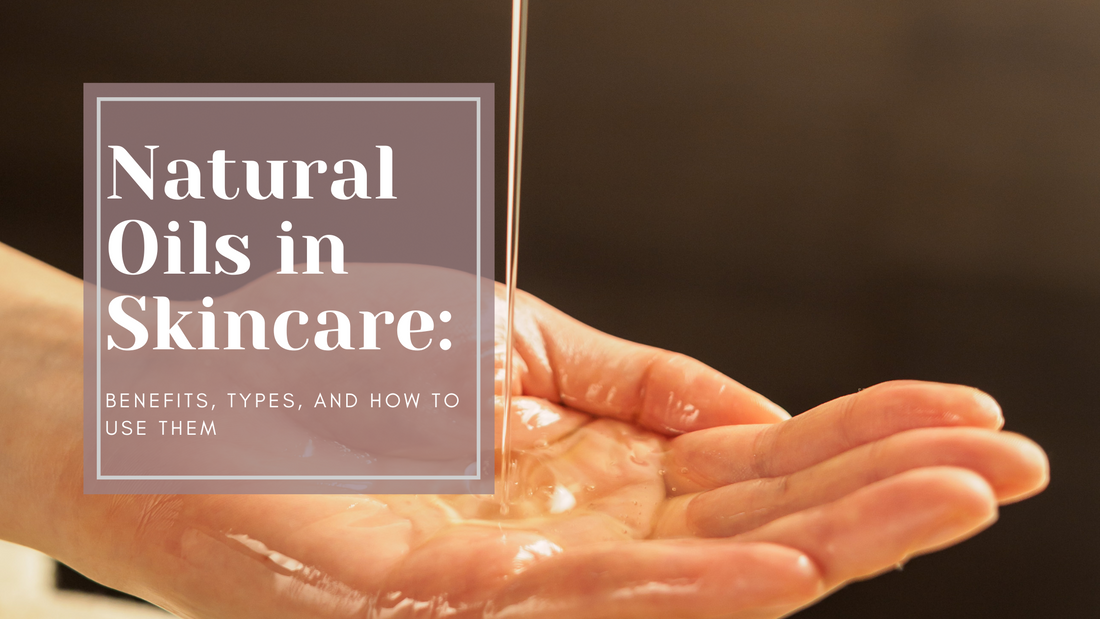
Natural Oils in Skincare: Benefits, Types, and How to Use Them
Share
🌿 The Ultimate Guide to Natural Oils in Skincare: Benefits, Viscosity & How to Use Them
Natural oils have long been cherished for their healing, moisturizing, and anti-aging properties. But not all oils are created equal—some absorb quickly and leave a matte finish, while others are richer and ideal for deep nourishment. In this post, we break down popular natural skincare oils, explain their benefits, whether they are dry or wet oils, and which skin types they suit best.
✨ What’s the Difference Between Dry and Wet Oils?
Dry oils absorb quickly into the skin without leaving a greasy residue. They’re ideal for daytime use or layering under makeup.
Wet oils are thicker and slower to absorb, offering deep hydration. Perfect for dry or mature skin and for overnight use.
🌸 Top Natural Skincare Oils, Their Benefits, and Textures
1. Jojoba Oil

Benefits: Balances oil production, mimics skin’s natural sebum, great for acne-prone skin.
Type: Dry
Viscosity: Light
Bonus: Non-comedogenic and suitable for all skin types.
2. Rosehip Oil

Benefits: Rich in vitamin C & A, fades scars, boosts collagen, brightens skin tone.
Type: Dry
Viscosity: Light to medium
Best For: Dull, pigmented, or aging skin.
3. Argan Oil

Benefits: Deeply nourishing, improves skin elasticity, reduces inflammation.
Type: Dry
Viscosity: Medium
Tip: Great for hair and cuticles, too!
4. Sweet Almond Oil

Benefits: Calms irritation, rich in Vitamin E, improves skin tone and softness.
Type: Wet
Viscosity: Medium
Best For: Sensitive, dry, or inflamed skin.
5. Avocado Oil

Benefits: Deeply moisturizing, rich in fatty acids, supports skin barrier repair.
Type: Wet
Viscosity: Thick
Use At Night: Ideal for intense moisture masks or body butter.
6. Grapeseed Oil
Benefits: Tightens pores, reduces redness, high in linoleic acid and antioxidants.
Type: Dry
Viscosity: Light
Best For: Oily and acne-prone skin types.
7. Coconut Oil (Unrefined)

Benefits: Antibacterial, anti-inflammatory, locks in moisture.
Type: Wet
Viscosity: Thick
Caution: Can clog pores; best for body use or very dry skin.
8. Squalane (from Olive)

Benefits: Mimics skin’s natural oils, non-greasy, improves elasticity.
Type: Dry
Viscosity: Very light
Best For: All skin types, especially dehydrated or combo skin.
9. Tamanu Oil

Benefits: Heals scars, reduces dark spots, antibacterial properties.
Type: Wet
Viscosity: Thick
Note: Best used as a spot treatment or blended with lighter oils.
10. Marula Oil

Benefits: Rich in antioxidants, hydrates without clogging pores, anti-aging.
Type: Dry
Viscosity: Medium
Use: Great under makeup or in night serums.
💧 How to Choose the Right Oil for Your Skin Type
| Skin Type | Best Oils |
|---|---|
| Oily/Acne-Prone | Grapeseed, Rosehip, Jojoba, Squalane |
| Dry/Dehydrated | Avocado, Almond, Coconut, Argan |
| Sensitive | Almond, Jojoba, Squalane |
| Mature | Rosehip, Marula, Argan, Tamanu |
🔀 Tips for Using Natural Oils in Your Routine
- Apply oils on damp skin to lock in moisture.
- Mix a few drops into your moisturizer or body lotion.
- Use dry oils in the morning, and richer oils as overnight treatments.
- Always patch test new oils—natural doesn’t always mean non-reactive.
🛁 Natural Oils in Angel Solutions Products
At Angel Solutions, we mindfully craft our bath and body products using a curated blend of high-performing natural oils. From Coconut Oil in our lip balms to Grapeseed Oil in our bath bombs, we use ingredients that nurture the skin—naturally.
👉 Explore our shop to find the oil-based goodness your skin has been craving.
📌 Final Thoughts
Natural oils are one of the most versatile, skin-loving ingredients in skincare. Whether you're looking to hydrate, heal, or glow, there's an oil for that. Understanding their texture, absorption rate, and skin benefits can help you create a routine that truly works with your skin, not against it.

